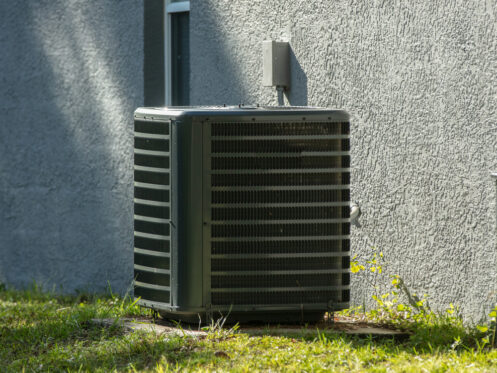Although Denver’s mountain climate is mild, summer days can soar past 100 degrees, making a reliable, energy-efficient AC with a proper SEER rating essential to keeping your home comfortable. So, what is a good SEER rating, and which rating is ideal for an air conditioner? The experts at High 5 Plumbing, Heating, Cooling, and Electric have some helpful insight into SEER ratings, factors to consider, and how choosing the ideal SEER rating can benefit you.
What Is a SEER Rating?
A Seasonal Energy Efficiency Ratio (SEER) rating measures how efficiently an AC or heat pump cools your home. This rating details the cooling output of an air conditioning unit over a typical cooling season, divided by the total energy it consumes. Overall, the higher the SEER rating, the better efficiency, lower energy bills, and reduced environmental impact. This isn’t just better for the environment — it’s also better for your monthly energy bills and total operating costs.
Understanding Different SEER Ratings
Most high-SEER-rating units cost more upfront but offer significant energy savings over time. But what do these different ratings mean in terms of overall efficiency? If you’re planning to replace an older AC or need a brand-new unit installed, here’s what you should know about each air conditioner SEER rating level and what they mean for you:
- SEER ratings 13-15: This range generally indicates that the air conditioner has standard energy efficiency and may work best in smaller homes or apartments in mild climates.
- SEER ratings 16-18: A SEER rating between 16 and 18 is considered mid-range and is generally suitable for most climates and average-sized homes.
- SEER ratings 19-21 or higher: Anything in this range is higher in terms of energy efficiency and works well if you want to maximize your energy savings, especially if you live in a hot climate.
- SEER ratings 22 or higher: An air conditioner with a SEER rating of 22 or higher is ultra-highly efficient, which means it offers the best long-term energy savings and has the highest upfront costs.
Factors To Consider When Choosing a SEER Rating
Now that you know what SEER means in HVAC, there are several factors to consider when choosing the right SEER rating for you and your needs.
- Climate: Denver’s mild climate means most homes can get by with a SEER rating of 14–16, but areas with prolonged heat benefit from 16 or higher.
- Home size: Larger or poorly insulated homes require more cooling power, so a higher SEER rating helps maintain comfort and efficiency.
- Budget: High-SEER systems have a higher upfront cost but lower long-term energy bills; lower-SEER units are more affordable initially.
- Usage: Frequent AC use makes a high SEER rating more cost-effective, while occasional use may not require the added efficiency.
Ideal SEER Rating for Different Scenarios
Every home, location, and individual is different, so specific SEER ratings are ideal for different scenarios.
- Hot and humid climates: Homes in warmer regions with frequent AC use should choose a SEER rating of 18 to 20 or higher to offer the best energy savings.
- Mild climates: A SEER rating between 14 and 16 in areas with moderate temperatures provides a good balance of efficiency and cost.
- If you’re on a budget: A SEER rating of 14 to 15 is more affordable upfront, while higher-rated units (16+) tend to cost more.
Focused on energy savings: Higher SEER ratings are ideal for reducing long-term energy use. However, factors like insulation and how often you run your AC will also impact overall efficiency.
Benefits of Choosing the Ideal SEER Rating
There are many benefits of choosing an air conditioning unit with an ideal SEER rating.
Lower energy costs
A higher SEER rating means less energy usage, helping you receive substantial savings on your monthly utility bill. Upgrading from a low, 10 SEER-rated unit to a 16 SEER-rated unit or higher can lower your costs by a significant amount. Plus, there are some state, local, and federal incentives for installing higher SEER systems to help offset the initial cost.
More comfort
Higher SEER AC systems tend to provide more consistent, reliable cooling. They also provide better humidity control for a much more comfortable indoor environment, which is especially helpful if you live in a region with high humidity levels.
Lower environmental impact
Since high-SEER units use less energy, they also have a lower carbon footprint and are better for the environment. Upgrading to an ideal SEER rating helps you minimize greenhouse gas emissions and live a greener, more sustainable lifestyle.
Longer lifespan
Today’s modern, high-SEER-rated units use more durable, long-lasting components. That means your brand-new air conditioning unit will operate efficiently and have a longer lifespan, saving you even more.
Try these tips to help maximize the efficiency of your air conditioning unit:
- Clean or replace air filters regularly per the manufacturer’s instructions, or when the filter gets dirty.
- Make sure nothing is obstructing your air vents, like furniture or area rugs.
- Use a programmable smart thermostat to monitor and conserve energy use.
- Always make sure your AC is appropriately sized for your home and household usage.
- Seal gaps or leaks around windows and doors, and make sure your home is adequately insulated.
- Schedule routine maintenance to make sure that your air conditioner is in good condition and performing optimally.
Choose the Right SEER Rating for Your Air Conditioning Unit and Stay Cool Efficiently With High Five!
The team at High 5 Plumbing, Heating, Cooling, and Electric is a leading HVAC contractor in the Denver, CO area. Our team is standing by, ready to help you with your home comfort needs, and we offer all the HVAC services you need in one place. If you want to upgrade to a high-SEER unit or schedule any of our other HVAC services, contact us today!

